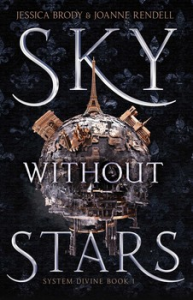Kat's Books
Photographer, book reviewer, mama, cat-lover in Seattle. Originally from England.
You can find my reviews on Goodreads, Amazon, and Edelweiss+.
School library volunteer at my son's K8 school. Member of ALA and YALSA.
Links: linktr.ee/romans_mama
Review requests ~ scriptkat@hotmail.com
Sky Without Stars is an epic futuristic reimagining of Les Miserables in space 'et c'est magnifique!'

Les Misérables, the historical classic novel set during the French Revolution and written by Victor Hugo in 1862, may never be seen the same way again after you read this YA sci-fi re-imagining. Sky Without Stars is the first in a series of novels in the System Divine set on the planet Laterre, where the divide between wealthy and poor is massive, and signs of revolution are everywhere.
There is so much to say about this book that it’s hard to know where to start in describing it, especially without revealing too much. While the size of it is daunting, its pace is even and kept me enthralled throughout; I didn’t want to put it down at all over an entire weekend. You also don’t have to know the story of Les Misérables (and many readers will likely only know the story from the several films of the same name) so I'll be a heathen and say it doesn’t matter if you haven't read the original book this is based on.
This glorious epic novel follows the lives of Chatine, Alouette, and Marcellus, and we gradually find out how a thief, a guardian, and a general can have such desperately different lives but actually have a lot in common.
Within the Frets of the planet Laterre, Chatine survives as a thief, her parents run a gang, and she hides her identity by posing as a boy. Beneath the city in The Refuge, Alouette lives within the Sisterhood, protecting the only surviving library of the Old World and unbeknownst to her, has been living her life behind a web of lies. Meanwhile, Marcellus, grandson of General Bonnefaçon, struggles with the responsibilities of living up to the standards of his grandfather and doubts the government he is supposed to serve and stand by. The paths of these three characters intersect in a fascinating world that melds scenes from Hugo's epic novel with a space-age future where humans have inhabited multiple planets many centuries from now. I found all three of them to be multi-faceted and to constantly be in tune with what was going on around them, and even when they were struggling or seemingly at their worst, I found myself pulling for them.
I was easily drawn in with the excellent world-building, which has shades of rebellion that made me think of Star Wars, but the new planet that everyone has inhabited still feels very French, with Français used throughout the book, so it keeps the heart of Les Misérables close. The science fiction comes across as plausible and frighteningly realistic (the best kind to read, in my opinion!). I lapped up all the details in this world that was created for these characters: Everyone has electronic ‘Skins’ implanted in their arms, and audiochips in their ears, and the squalor that everyone lives in is hard to digest; it made me think of Bladerunner, that fusion of the old and new. The very fact that the written word has become extinct, that books have become extinct (and protected by the Sisterhood) is heartbreaking. Being able to actually read has also become a rare skill.
The planet is illuminated by three fake Sols and the moon has become a prison colony, even the use of fire has been banished. It seems there is some forest on the outskirts of the city and on the periphery of LeDome; all of these environments and areas are sketched out in a map in the front of the book. There are also other planets described in the System Divine and I really hope they are visited in subsequent novels in the series.
Authors Brody and Rendell have created an entire imagined parallel universe that I could’ve kept on reading about for hours longer, no matter how sobering and dark.
There is action, adventure, science-fiction, romance, the feeling of reading a history, as well as political intrigue, an underground revolutionary uprising called the Vanguarde. Based on one of the greatest novels of all time, ‘Sky Without Stars’ depicts a future where the chasm between classes has grown exponentially, but the layers in between make this novel irresistible.
 1
1